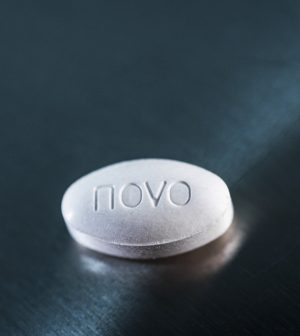- Could Your Grocery Store Meat Be Causing Recurring UTIs?
- Are You Making This Expensive Thermostat Error This Winter?
- Recognizing the Signs of Hypothyroidism
- 10 Strategies to Overcome Insomnia
- Could Artificial Sweeteners Be Aging the Brain Faster?
- Techniques for Soothing Your Nervous System
- Does the Water in Your House Smell Funny? Here’s Why
- Can a Daily Dose of Apple Cider Vinegar Actually Aid Weight Loss?
- 6 Health Beverages That Can Actually Spike Your Blood Sugar
- Treatment Options for Social Anxiety Disorder
Novo Nordisk Moves to Stop Businesses From Selling Compounded Versions of Wegovy, Ozempic

(HealthDay News) – The maker of three popular drugs that treat weight loss and diabetes said Tuesday that it has begun legal proceedings against businesses that are selling compounded versions of its products that are not approved by the U.S. Food and Drug Administration.
In a statement, the company said it is telling these med spas, weight loss clinics and compounding pharmacies “to cease and desist from false advertising, trademark infringement and/or unlawful sales of non-FDA approved compounded products claiming to contain semaglutide.”
Novo Nordisk makes the weight loss drug Wegovy and the diabetes drugs Ozempic and Rybelsus, and semaglutide is the key ingredient in those medications.
“These unlawful marketing and sales practices … have created a high risk of consumer confusion and deception as well as potential safety concerns,” Novo Nordisk said.
“Compounded products do not have the same safety, quality and effectiveness assurances as our FDA-approved drugs and may expose patients to health risks,” the company said. “Novo Nordisk cannot validate the safety or effectiveness of products claiming to contain semaglutide that are not one of our own branded products. Novo Nordisk is the only company in the U.S. with FDA-approved products containing semaglutide, and no FDA-approved generic versions of semaglutide currently exist.”
In May, the FDA also warned customers about these alternate products and the compounding of these medications, noting that people have reported adverse events and that patients “should not use a compounded drug if an approved drug is available.”
But two of the Novo Nordisk drugs, Ozempic and Wegovy, have been in short supply since last year.
“When a drug is in shortage, compounders may be able to prepare a compounded version of that drug if they meet certain requirements of the Federal Food, Drug, and Cosmetic [FD&C] Act,” the FDA said in its warning, but the drugs are not reviewed for quality or safety.
The compounded versions of semaglutide may be using salt forms, such as semaglutide sodium and semaglutide acetate, with different active ingredients than those approved by the FDA.
“The agency is not aware of any basis for compounding using the salt forms that would meet the FD&C requirements. … Products containing these salts, such as semaglutide sodium and semaglutide acetate, have not been shown to be safe and effective,” the FDA noted.
Meanwhile, Novo Nordisk is working to increase production of Wegovy to meet demand, CNN reported.
The company said people who have been prescribed semaglutide “should be vigilant in checking their medicine to ensure they are taking an authentic” version. It has a website, semaglutide.com, that explains how to tell authentic versus compounded versions apart.
The therapy is considered one that has to be continued for life to maintain weight loss, but Novo Nordisk is researching possible maintenance options, CNN reported.
“Based on the knowledge we have today, we’re talking about a chronic treatment in order to maintain weight loss,” Dr. Martin Holst Lange, executive vice president of development at Novo Nordisk, said during an earnings briefing on Tuesday.
More information
The U.S. Food and Drug Administration has more on semaglutide.
SOURCE: Novo Nordisk, news release, June 20, 2023; U.S. Food and Drug Administration, news release, May 31, 2023; CNN
Source: HealthDay
Copyright © 2026 HealthDay. All rights reserved.










